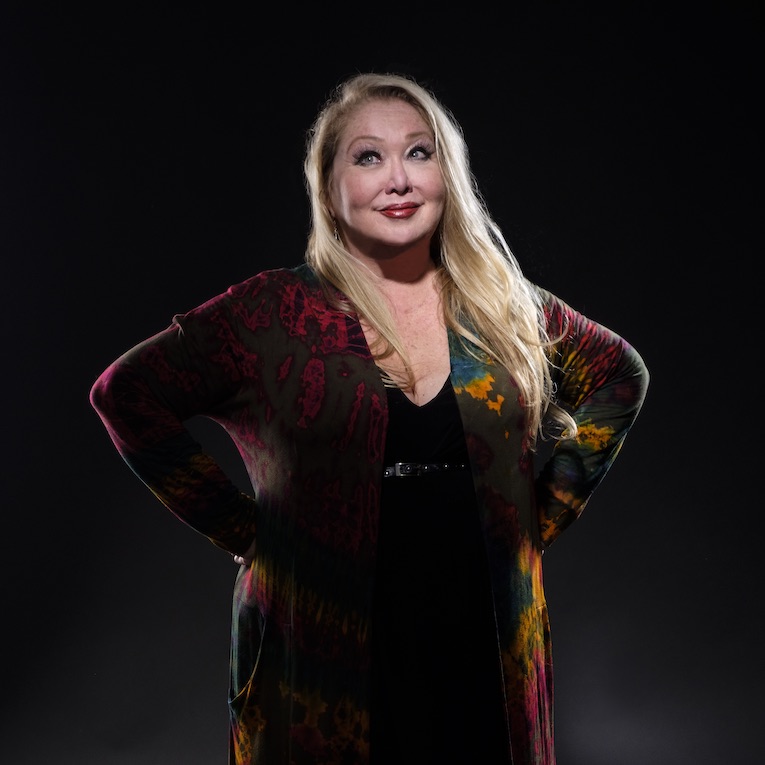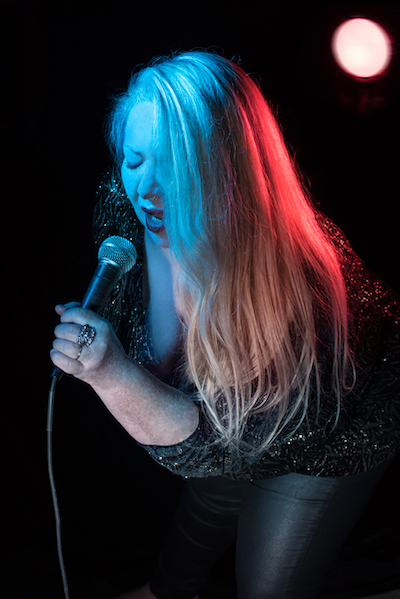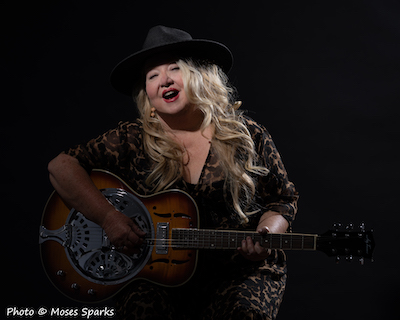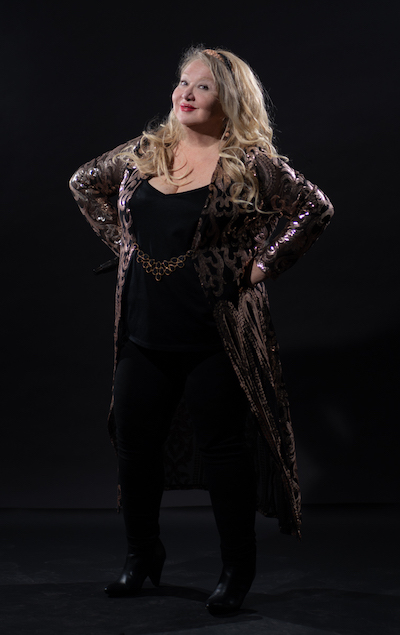
Deb Ryder
By Martine Ehrenclou
Multi award-winner, blues vocalist, songwriter, Deb Ryder is about to release her fifth studio album, Memphis Moonlight produced by Grammy Award-winner Tony Braunagel, co-produced by Ric W. Ryder. Out June 11 on VizzTone Label Group, the blues diva delivers superior lyrics and musical arrangements on all thirteen original songs with a powerhouse voice that’s soulful and gutsy, reminiscent of some of the great blues vocalists that came before her.
Ryder is known for her powerful vocals, captivating stage presence and smart songwriting. Memphis Moonlight features an all-star cast including Tony Braunagel, Johnny Lee Schell, Mike Finnigan, Travis Carlton, Pieter Van der Pluijm, Joe Sublett and Mark Pender. Special guests include Ronnie Earl, David Hildago, Steve Berlin, Alastair Greene, Joey and Steve Delgado.
Before releasing albums, Ryder performed on numerous national TV commercials, movies, and Las Vegas musicals, and had a very successful run as a session artist in L.A. Her first album, Might Just Get Lucky, recorded by Ryder and her husband, bassist Ric Ryder, was released in 2014, which kicked off her solo career in the blues. She then teamed up with Tony Braunagel and released three critically acclaimed albums, Let it Rain, Grit Grease & Tears, and Enjoy The Ride (2018).
Ryder has a fascinating musical history that includes growing up in Topanga Canyon with many music greats such as Etta James, Big Joe Turner, Taj Mahal, and Canned Heat.
When I asked her about her new album, Memphis Moonlight, she said, “It’s got an interesting story, this one.” And this began a conversation flush with memorable storytelling, laughter, and interesting facts about Deb Ryder’s new album, songwriting and musical background.
Deb said, “I’d written 25 tunes. Tony, my husband and I got together and picked out the ones we thought were most viable and went into Ultra Tone Studios with the usual suspects. That was February of 2020. We got the basics down for four tracks and then the lockdown happened. We didn’t know when we were going to be able to get back in, if ever. Things in L.A. were bad (with COVID) but being somebody that’s not easily deterred or derailed—”
I interjected, “I can hear that strength in your music, your songs.”
“I’m just one of those people. I put my nose to the grindstone and find a way,” Deb shared. “I also became incredibly prolific with all the time I had on my hands, and found that there was a lot of subject matter this last year to write about. I let go of half of the tracks that we had decided to record and wrote a whole bunch of new ones. Given that the guy we usually record with, Johnny Lee Schell (Bonnie Raitt) down at Ultra Tone was just sitting in his studio and couldn’t go anywhere either (COVID lockdown), we did a lot of remote ideas back and forth between me and Tony and Johnny with new tracks. In the past, we’d run in to record and five days later we’d start overdubbing and have a record done.
The general direction of the record really changed over 2020. It’s like we started all over again, which I’m so grateful for because I’ll tell you, that kept me sane.”

I said, “I can imagine. I identified with a few of your tunes, one in particular, “Hold On.”
“Thank you. I think a lot of people will be able to identify,” she said. “I wanted that to be a really uplifting tune and not so political but I was also pretty pissed off about how I felt like the previous administration had sort of left us to drown. So, it ended up being a little bit more political than I originally intended.
I wanted the whole record to be more uplifting. Because if we were going to release this and still be on lockdown, I wanted real energy happening in the tunes, the vocals and the instrumental choices. I also wanted a real diverse and eclectic bunch of music so that people out there that have just been sitting waiting to hear something from somebody, would be able to identify, for one reason or another, to many of the tracks on the record.”
In reference to the lockdown and restrictions, she said, “Who’s going to play on this record? Who has the capacity or the ability to record from their home?”
Knowing she hadn’t been able to use her previous band because of the Covid lockdown, I said, “You have an all-star cast of musicians on the record.”
Deb explained that she talked with all the musicians and asked everyone to give her three or four different versions of their interpretation of what she wanted and was delighted that each of them nailed it. “I needed a willing, talented and very technically savvy village who were highly innovative. I think the record is better for it and I’m proud of the results.”
Having listened to Memphis Moonlight, I said, “It’s outstanding. The songwriting is excellent. How did you come up with songs like, ‘These Hands’ with the gospel lyrics and music? Tell me about your songwriting.”
Deb said, “I might have 10 songs going on at a time and one might end up being the ultimate inspiration to finish the whole thing. I tend to work things to death in some cases, and in others, it comes to me like a movie reel. It’s a really varied process for me, but generally, it’s lyrics first. I believe in the written and the spoken word. I might just get an idea driving and I have to pull over and type it down. I write a lot from my own life experience, but also much of it is just complete fantasy.”
I asked her if she played an instrument or if she comes up with the melody and lyrics in her head. Deb said, “I come up with it in my head. Once I get the lyrics down, they pretty much speak to me about the style of blues, or rock or jazz that the tune is going to be and then I’ll start working on the melodic stuff. Generally, it’s about a vocal lick that I can’t get out of my head.”
“Do you hear the instruments also?” I asked.
“I’m one of those crazy people,” she laughed. “Many times, I actually get things in dreams and that’s why I keep something near my bed. The melody for “I’m Coming Home” came to me in this dream and I woke up and I sang it. My poor husband’s a bass player. There are times I’ll wake him up and make him play. He’s really, really good.”
“And a nice guy to do that for you.” We laughed. I prompted her to tell me about the song “Coming Home” as her voice was so soulful and emotional.
Deb said, “I want to mention about my voice on this record. If you’re familiar with my other records, they’re far more perfect, especially vocally. This was a situation where I had to let a lot of my nitpicky self. You couldn’t go into a studio (COVID.) I had a friend who had a little home studio in the desert, nobody was coming by. I’d go out there, and I’d get an opportunity to take two passes, three at the most, and these vocals are pretty raw. It was more about the emotion that I needed to project in the song or the feeling, rather than the actual pristine, or vocally acrobatic vocal.

Photo: Moses Sparks
Deb continued with a story. With “‘I’m Coming Home’ I had a lot of time on my hands, so I cleaned out a bunch of boxes in the closet and I found some old love letters from my husband, Ric, who back in the day, was on the road with everybody. I found these love letters from him and some of the lines in the song were in there. I shed a few tears. He was gone months at a time because back in those days, he didn’t go out for seven days, he went out for seven months on big tours like Yes, REO, Dirty Dancing.”
I asked her about the title track, “Memphis Moonlight,” an acoustic track with some fine storytelling.
“That is one crazy story,” she said. “That’s one of those tunes that came to me like a movie. Music, lyrics, the whole thing, like a movie script. I didn’t experience any of that. I just wrote it.”
Intrigued, I asked, “When those songs come like that, you said like a movie script in your mind, when does it happen? What’s it like?”
“That particular day, I was driving for four hours and the song was done by the time I got there. I wasn’t in Memphis, I was in California. We’d been to Memphis not that long ago and I’ve seen the moon on the river and the bridge. I hit record. Actually, I have the original recording with the cars going by,” she laughed. “It was just like a movie scene. It just came to my mind. It was a fantasy that just unfolded. I got off a plane in Memphis. It was about to rain so the sky was very gray. It was in the evening. Fade to black and white with a full moon on the Mississippi and I was transported to when I left him and how much I regretted it. I was young and I had this longing to be free and so I left this man.
Now, this didn’t happen to me but that’s how I wrote it and in my brain I remember that night when we danced by the river and the Memphis moonlight. I could hear that,” she explained.
And then over the phone, Deb sang three seconds of the song, “Whoa… in the Memphis Moonlight.”
“Your voice, damn,” I said.
Knowing a little about Deb Ryder’s deep music history, I asked her about growing up in Topanga Canyon and learning from Etta James, Bob Hite (Canned Heat), and playing with Big Joe Turner, Neil Young, Stephen Stills and Taj Mahal.
Deb described her experience after her parents divorced. “Mom, at that point, being a young mother of five and a born again true California hippie, she moved us up to Topanga Canyon into this little three-room cabin that didn’t even have windows and doors. She was such a beauty, she could get a contractor to do anything. (Laughter) She met my stepfather, one of the contractors, and they opened up the most famous, biggest grossing rock and blues nightclubs in the 70s called the Topanga Corral.
We moved into a little house directly behind the club. Back in the 60s and 70s Topanga was a complete mecca for blues and rock musicians and I’m talking everybody who was anybody played there. On an average week, you’d have Taj Mahal, Spirit, Canned Heat, Neil Young, Buffalo Springfield, the Eagles.
My bedroom was down at the bottom of the house and it almost joined the walls of the club. There was no sleeping when I was a kid. My mother worked in the bar and so did my stepdad and the music was so loud. I’d get the kids to bed (her younger siblings) and my older brother watched them and I’d go down there and sit at the end of the stage and just listen and learn and just suck it all in.
I asked her how old she was then.
“Probably about 12 or 13. I played guitar. We had some cabins way in the back and Etta James used to come and stay for a while when she’d play. I think she just liked getting away. I’d knock on the door and say, “Miss Etta?” She’d let me in and I’d sit there with her. She didn’t have to spend time with me but she did. She’d tell me, ‘What are you trying to do? Rewrite the blues? Why don’t you study the blues? Why don’t you take 200 words out of that song and learn what songwriting is about?’ She worked with me and then she’d be gone for months.”

I asked Deb if she thought Etta James influenced her songwriting. She said she thought so but emphasized that Bob Hite from Canned Heat was a big influence. Going over to his house, she explained that Hite had the most famous collection of antique records and he would lay them out in order for her to listen to them. “I wasn’t allowed to touch anything else but I was to listen to the world’s greatest old blues. So, he was a huge influence.
To top it off, my stepdad had Big Joe Turner every Sunday (performing at the Topanga Corral) and I would run up the ramp and I’d say, ‘I’m here Big Joe, I’m here” and he’d go, “Well, warm up that band.” I learned every single song because he played the same set over and over and I learned how to sing the blues.
The next time Etta came, I had a couple more songs that I’d written and they still weren’t right and she told me I still wasn’t singing the blues. This went on for a couple of years and finally one day she said, “Now you got it. Now you’re singing the blues.” It was like electricity through my body. And she said, ‘I want you to open for me this weekend and I did with my silly little band.”
“How old were you?” I asked.
“I was 17 or 18. We opened for her at The Corral. It was my stepdad’s club so it was easy for me to get in there. Those are my influences. It’s funny because when you’re a kid, it’s just normal stuff, you don’t know.
I used to clean up the stalls at the Buffalo Springfield ranch and take care of currying and feeding the horses after school, and if I was good, and got my job done fast enough, and had my guitar with me, which I always did, I could go up on the porch and jam with Neil Young and Stephen Stills. I was only about 12.”
I mentioned that the way she described Topanga Canyon, it sounded a lot like Laurel Canyon with all the famous artists living there.
She agreed. “They were like sister musical canyons during the same time period. Half of the bands lived in Laurel and the other half in Topanga. Bernie Leadon from the Eagles was here in Topanga, and the other half of the Eagles were living in Laurel. Linda Ronstadt was here. Joni Mitchell, Neil Young, Crazy Horse, Buffalo Springfield were here. All of Spirit lived here.”
Deb added something else. “I have another story to tell you. My mother, before the Corral, ran a little place called The Moonfire in Topanga and she was a short order cook. She made incredible pancakes and pies and Taj Mahal would come there and bring his fretless banjo and if she’d make him pancakes, he’d perform.” Deb continued. “On certain days of the week there’d be a mountain of dishes I had to wash. But sometimes I got to hang with Taj Mahal and play a little bit of guitar. It was a really magical time.”
I said, “That’s a great story.”
“I’ve got an incredibly blessed musical background from my father (Al Swanson) to my grandmother to my Topanga days, but it was Topanga when I knew I wanted to perform. I knew I was going to be a singer, songwriter. After that, I had this crazy, incredible career as a background singer. I did tv commercials, radio, TV spots, sang on everybody’s records. I wrote my own songs and had this giant collection of songs. One day my husband and I worked this stuff out and on a wing and prayer we put my first record together in 2013 called, Might Just Get Lucky. It blew up and here we are at number five. I feel really, really privileged to be a part of all of it.
For more information about Deb Ryder see her website here.
Listen to “Second Chances”

Leave A Comment